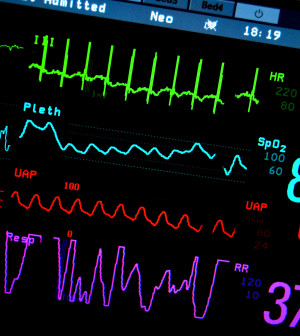- Could Your Grocery Store Meat Be Causing Recurring UTIs?
- Are You Making This Expensive Thermostat Error This Winter?
- Recognizing the Signs of Hypothyroidism
- 10 Strategies to Overcome Insomnia
- Could Artificial Sweeteners Be Aging the Brain Faster?
- Techniques for Soothing Your Nervous System
- Does the Water in Your House Smell Funny? Here’s Why
- Can a Daily Dose of Apple Cider Vinegar Actually Aid Weight Loss?
- 6 Health Beverages That Can Actually Spike Your Blood Sugar
- Treatment Options for Social Anxiety Disorder
Early Onset Hot Flashes May Point to Raised Heart Disease Risk


Women who start having hot flashes at a younger age may be at increased risk for heart disease, according to two studies conducted by the same team of researchers.
One of the studies also found that women who have more frequent hot flashes during a typical day may be at raised heart risk.
Led by Rebecca Thurston, of the University of Pittsburgh, the studies found that women who begin experiencing hot flashes earlier in life appear to have poorer function of the lining of the blood vessels than those who have hot flashes at a later age, or not at all.
Impaired function in the blood vessel’s walls — called reduced endothelial function — is the earliest sign of heart disease, the researchers noted.
“Hot flashes occur at a time in a woman’s life when her risk for heart disease increases,” said Thurston, who is an associate professor of psychiatry, psychology and epidemiology at the university. The new findings suggest that earlier onset of hot flashes may help doctors spot women who are at greater risk for heart disease, she said.
In one study, 189 women either in or just out of menopause wore a special monitor for 24 hours to track the frequency of their hot flashes. Their blood vessel health was checked via ultrasound tests to arteries in the forearm.
The study found that more hot flashes in that 24-hour period were linked to worse blood flow in younger women — those aged 52 or younger.
The number of hot flashes per day also seemed key. Women who experienced 10 or more episodes per day had a 50 percent reduction in how well their vessels expanded during normal blood flow, compared to women without any hot flashes, the researchers said.
The second study drew on questionnaires given to 104 older women in the postmenopausal stage who already had signs of heart disease. It found that women who said they experienced their first hot flash when young (age 42 or below) had significantly worse blood vessel health than those whose hot flashes started later in life. The finding held even after the researchers accounted for age, hormone use and history of heart disease, the team said.
One expert in women’s heart health agreed that the findings could have implications for clinical practice.
Women with early onset hot flashes may be “a group for whom early prevention and aggressive preventive strategies should be implemented,” said Dr. Suzanne Steinbaum, director of women and heart disease at Lenox Hill Hospital in New York City.
“As we learn more about these unique risk factors for women, it is imperative that we target a prevention strategy, as we know that the outcomes for heart disease in women are worse,” she said.
Dr. Vijayapraveena Paruchuri directs the Center for Adult Congenital Heart Disease at Winthrop-University Hospital in Mineola, N.Y. She believes the new study “builds on recent findings that the hormonal profile and changes unique to women are important considerations that physicians need to be aware of.”
According to the researchers, more than 70 percent of women have hot flashes and night sweats at some point during menopause.
Further research is needed to pinpoint the precise age at which hot flashes seem to be most strongly linked with poor endothelial function, to determine if the severity of hot flashes plays a role, and to identify any shared mechanisms between hot flashes and endothelial function, the research team said.
The studies are slated to be presented March 16 at the annual meeting of the American College of Cardiology in San Diego. Findings presented at medical meetings are typically considered preliminary until published in a peer-reviewed journal.
More information
The U.S. National Institute on Aging has more about hot flashes and other menopausal symptoms.
Source: HealthDay
Copyright © 2026 HealthDay. All rights reserved.










